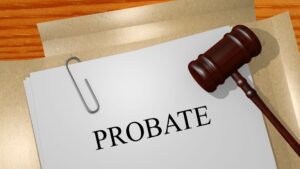
A probate sale is the sale of a deceased person’s real property overseen by the probate court. Because there might be competing interests in that real estate, there can be legal ramifications to buying, selling, or possessing property from a probate sale. When you are participating in a probate sale, an attorney familiar with New York’s Surrogate Court and New York estate law can help protect your rights.
Several parties can benefit from a probate sale: the decedent’s beneficiaries, creditors, and homebuyers. Regardless of your role in the transaction, a New York estate attorney can explain your options and help you understand the pros and cons of a probate sale. Don’t hesitate to contact the Law Office of Andrew M. Lamkin, P.C. today.
What Is A Probate Sale in New York?
A probate sale is a court-managed process for selling real estate belonging to a deceased person’s estate. After a person dies, their property belongs to their estate. The estate administrator must manage the estate as a personal representative or fiduciary. That person will provide an inventory of the estate assets and liabilities to the Surrogate’s Court—which is the court that handles probate matters in New York—so the estate property can be distributed. Before distributing estate property to the decedent’s beneficiaries, the administrator must pay for the decedent’s remaining obligations, like bills, debts, funeral expenses, and taxes. An administrator may use a probate sale to liquidate real estate owned by the estate to satisfy obligations or provide value to the beneficiaries.
How Does a Probate Sale Work?
The probate sale begins when the estate administrator or a beneficiary files a petition with the Surrogate’s Court. An estate creditor cannot initiate a probate sale. The court reviews the facts and issues an order that is fair considering the property’s value and the interests at stake. The court may order a public or private sale, impose terms and conditions, or order a transfer to a beneficiary. When the court orders a sale, property granted by a will is the last to be sold.
Will the Family Home Be Sold in Probate?
The decision to sell a family home during probate will depend on several factors, including the will’s terms, the estate’s debts and expenses, and the beneficiaries’ wishes.
If the will specifies that the family home should be sold as part of the probate process, then the administrator may proceed as directed. If the will or estate plan is silent on the issue, the administrator may sell the home if necessary. While the court makes the final determination based on the circumstances, some lawful reasons to sell the home include:
- To pay the estate’s administrative expenses;
- To cover funeral expenses;
- To pay off the person’s debts; and
- To pay taxes, including estate or death taxes.
In some cases, the beneficiaries may agree to sell the home to distribute the proceeds among themselves.
What If I Live on the Property?
The rights of a beneficiary living on property sold during probate depend on the circumstances and the will’s terms. If you are a tenant who pays rent, you may continue to reside in the property until the end of your tenancy agreement. However, if the will specifically devises the property to you, title to the property vests immediately upon your loved one’s death. Unless granted permission by the court, the estate administrator may not manage real property that is specifically devised by a will.
In each case, it is vital to review the will’s terms and the applicable state laws and regulations to determine your rights. If you live on property subject to a probate sale, contact an experienced attorney to discuss your options.
Why Would a Home Be Sold Through Probate?
A home may be sold through probate or passed on to the beneficiaries. If fair, the court may order a probate sale for several reasons, including:
- To settle an estate—the administrator may sell the estate’s real property to liquidate its value and redistribute it to the beneficiaries;
- To pay debts and taxes—if the estate owes debts or taxes, the sale may help pay them off; and
- To avoid disputes—selling the property may be the only way to resolve beneficiary disputes without a lengthy court battle.
The estate administrator typically handles the sale, following the court’s order. Usually, that means a public sale, although the court retains the right to approve or reject the terms and bids. Because it is a public sale, a spouse, beneficiary, or creditor is free to bid. If they buy the property, they can receive a credit for their share of the estate toward the purchase price.
Should You Buy a Home Through Probate?
Even though a probate sale can mean a bargain for a homebuyer, there are a number of things to think about before moving forward with a purchase. Some potential advantages of buying a home through probate include the following:
- Potential for a good deal—homes sold through probate may be priced below market value because the estate needs to settle and disperse the assets promptly; and
- Clear title—since probate resolves debts and liens, probate-sold homes usually have clear titles.
However, there are also some potential disadvantages, including:
- Time and uncertainty—the probate process can be time-consuming, and there may be uncertainties or delays along the way;
- Cost—the cost of a probate sale can be higher than a traditional home sale, as there are often legal and administrative costs involved; and
- Condition of the property—homes sold through probate may be in poor condition, as the decedent or administrator may not have maintained the property.
Buying a home through probate is not all bad and could benefit buyers who know about home construction or flipping. However, buying through probate isn’t for everyone, as it comes with additional costs, time, and expenses. If you’re interested in buying a home from an estate, an attorney can help you understand the potential risks.
The Law Office of Andrew M. Lamkin P.C. Can Help
The Law Office of Andrew M. Lamkin has been helping New Yorkers with estate planning and probate matters since 2007. Whether you are the estate administrator, a beneficiary looking to inherit property, or a buyer interested in purchasing a property through a probate sale, our team can help ensure that your rights are protected and that the sale is conducted in a manner that is in your best interests. From advising on the probate process and reviewing legal documents to representing you in negotiations and navigating the court process, we can provide valuable assistance every step of the way. Contact us today to find out more about how we can help you navigate a probate sale in New York.


